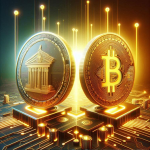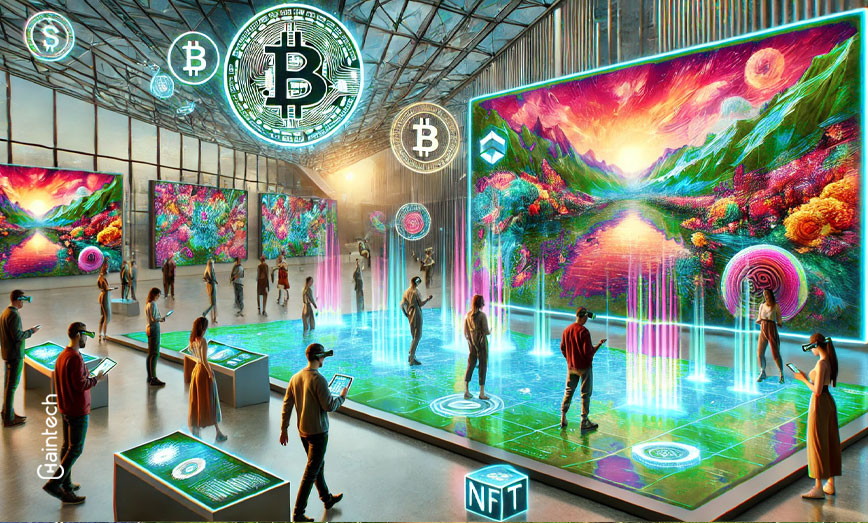The Role of Tokenization in DeFi (Decentralized Finance)

Imagine having a beautiful piece of real estate or art without the need for a bank, not to mention a broker or another type of third-party middleman. Tokenization, at least in decentralized finance, DeFi, is making this true: it changes how one acquires and controls assets when it transforms traditional resources into digital tokens.
Ownership through tokenization is not limited to the ownership of merely digital assets but also paves the way for security, transparency, and opportunity that can be used as methods of investment, trade, or wealth growth around the globe.
Tokenization in DeFi: Simplifying ownership and expanding access to valuable assets
- Tokenization takes the process of eliminating intermediaries all the way, thereby making transactions cheaper and simpler.
- Utility, security tokens, and NFTs are reshaping how individuals interact with assets in DeFi.
- Tokenization offers fractional ownership, meaning investors can have shares in assets such as real estate and art.
Keep reading to discover how tokenization could redefine ownership in the financial world and how DeFi brings finance closer to everyone!
Understanding DeFi and tokenization: What’s all the buzz about?
This is essentially decentralized finance, which can be said to refer to an entire system of old-timey financial services running on a blockchain network free from the services of any intermediary, such as a bank.
The point is to give people greater control over their assets. Due to blockchain technology, transactions are transparent, secure, and accessible from any place in the world with an internet connection. This means direct control over your money, as in a digital wallet, but with the traditional bank account minus the traditional banking.
This process brings in tokenization, and that is a game changer. Tokenization means you take real-world assets—property or goods—and turn them into digital tokens that show ownership. These digital tokens can be easily sold or traded on decentralized platforms, increasing efficiency and transparency.
So, let’s take a simple example: a $500,000 property. Under traditional methods, you will have to raise that entire sum to buy the property, but tokenization lets you divide the property into 500,000 digital tokens, each worth $1. Investors can buy as many tokens as they want, owning a fraction of the asset without managing physical property.
Types of tokens in DeFi: Utility, security, and NFTs
Tokens in DeFi aren’t all the same. There are all kinds of types, actually, each one fulfilling an individual role within the economy of the decentralized. In short, here are some of the major ones:
| Token Type | Description | Common Uses |
| Utility Tokens | Access rights to specific services or products within a network | Payments for services in decentralized apps (DApps) |
| Security Tokens | Represent ownership or shares in an asset | Investment opportunities with dividends and voting rights |
| NFTs (Non-Fungible Tokens) | Unique digital assets representing specific items | Art, music, event tickets |
These tokens create various ways for people to interact with DeFi, whether it’s accessing digital services, investing, or even owning unique digital items like art.
Tokenization’s impact across industries
Tokenization isn’t limited to one area. It opens doors in finance, real estate, art, and more.
- Finance: Tokenization streamlined the trading process. Assets are now tradable in digital format but with all the security associated with a traditional market minus the barrier.
- Real Estate: Tokenization permits fractional ownership. Therefore, it reduces the entry barriers to investing in real estate. It makes investing small amounts into huge, valuable properties possible.
- Art and Entertainment: Artists are now selling digitally NFTs of their artwork. NFTs help authenticate and sell an art piece on the blockchain and open new channels for revenue.
- Supply Chain: Companies can track commodities through the tokenization of an asset in a supply chain. This reduces fraud; therefore, the whole system becomes more transparent and efficient.
Benefits of asset tokenization in DeFi
The advantages of tokenization in DeFi are significant:
- Decentralization: Tokenization facilitates decentralized finance’s goal of getting rid of intermediary parties by making transactions streamlined and costs lower.
- Creation of liquidity: The ownership of the asset on a fractional basis makes it easily sold or bought, with assets as illiquid as real estate.
- Security: The security of blockchain means that the transactions from the tokens are safe as well as tamperproof, so the risks concerning fraud come down.
- Accessible high-value assets: Due to tokenization, a person is given access to other people by making it open to those who cannot indulge in their markets before.
The reasons why DeFi is growing in strength and power as a counter to traditional finance lie in the benefits it’s providing. Tokenization unlocks new freedom in how one interacts with financial services.
Did you know?
Healthcare uses tokenization to securely manage patient health information for better privacy and easier access.
Challenges facing DeFi and tokenization
However, the promise that DeFi and tokenization bring also brings with it its own set of problems:
- Regulatory Issues: As DeFi operates at a global level, varying rules on digital assets mean different countries have different standards. This complexity makes it hard to navigate legal landscapes.
- Security Risks: The blockchain is secure, but the risk of hacking still exists. Weak protocols can be vulnerable to attacks, requiring continuous improvements.
- Public Awareness: Many people still don’t fully understand DeFi or tokenization. Education of the public is essential for broader adoption.
Addressing these challenges is essential for DeFi and tokenization to grow. As the technology matures, these issues will become more manageable.
Real-world applications of DeFi asset tokenization
DeFi asset tokenization is already making waves in several industries, bringing new ways for people to participate and invest. Here are some real-world applications:
- Finance: Tokenization has transformed financial services from margin lending to payments. It provides more accessible, secure ways for users to manage finances without needing traditional banks.
- Real Estate: Fractional ownership through tokenization is reducing the barriers to real estate investment. Platforms now allow people to invest in properties with minimal amounts, creating a fairer market.
- Healthcare: In healthcare, tokenization secures patient data and enables easy access while keeping personal information private. Platforms like Clincoin connect users with healthcare providers using token-based rewards.
- Sports: Tokenization in sports allows fans to buy and trade sports-related assets and experiences, creating a more engaged community and new revenue channels.
Tokenization is increasingly offering practical solutions across various sectors, breaking down traditional barriers and enhancing transparency.
Future of DeFi and tokenization
Looking forward, tokenization in DeFi will become a lot more significant. It is expected that, in the future, most assets will be tokenized and that there will be many more investment opportunities than exist today. In essence, it means that valuable assets will be available for access to people across the world who could not earlier get hold of them.
DeFi is bound to be decentralized and far more embracing in nature and thus opens financial services for everybody with any internet connection. Whether through real estate investments, trading digital art, or managing healthcare data, the applications of tokenization are broadening. The future of tokenization in DeFi is set to make finance a truly global, accessible system.
Did you know?
The tokenization market will close to about $4.85 billion by 2025 at a rapid growth rate.
The path forward for DeFi and tokenization
Tokenization in DeFi is far from a trend but will lead to the opening of easy access to financial systems and products in the future. Tokenization makes ownership more effortless, safe, and reachable for people.
Through its digital tokenized assets, more opportunities for democratization are coming about in various industries—from real estate to health, DeFi can grow continuously due to advancing technology. The future of finance is decentralized—are you ready to be a part of it?
FAQs
1. What is DeFi asset tokenization?
DeFi asset tokenization refers to the process of generating digital tokens that represent ownership or rights to real-world assets, allowing them to be traded on decentralized platforms.
2. How does tokenization benefit investors?
Tokenization offers fractional ownership, so investors can hold smaller shares of high-value assets. This increases market access and makes investing more affordable.
3. Are there risks involved in DeFi tokenization?
Yes, there are regulatory issues, security vulnerabilities, and public education challenges. All these are gradually being dealt with as the industry matures.
4. What are some examples of tokenized assets?
Real estate, art, financial securities, and even healthcare data are some examples. Tokenization enables secure, transparent trading across such sectors.
5. Can tokenization make finance more inclusive?
Absolutely! Tokenization reduces the barriers to asset ownership; it lets more and more people participate in markets that were earlier more or less limited to a small network of wealthier investors.









